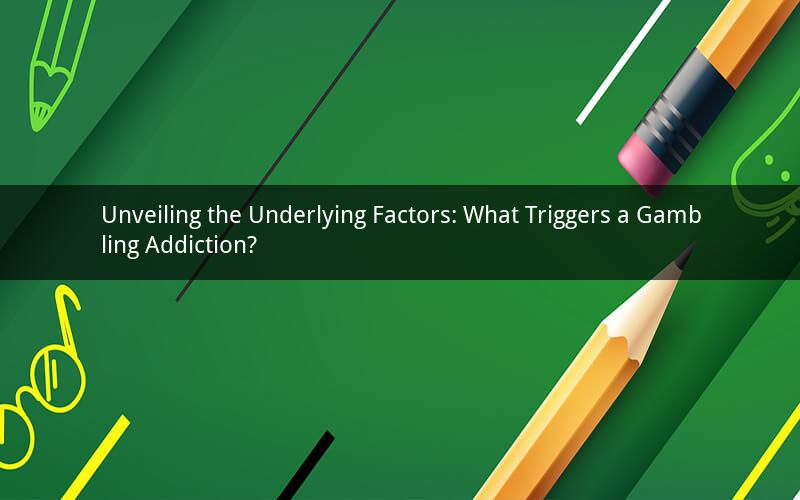
Gambling addiction, also known as pathological gambling, is a complex disorder that affects millions of individuals worldwide. It is characterized by an irresistible urge to gamble, despite the negative consequences it may bring. Understanding what triggers a gambling addiction is crucial in preventing and treating this disorder. This article delves into the various factors that may contribute to the development of a gambling addiction.
1. Genetic Factors
Research suggests that genetics play a significant role in the development of gambling addiction. Individuals with a family history of addiction, particularly to substances like alcohol and drugs, are more susceptible to developing a gambling addiction. Certain genetic markers have been identified that may predispose individuals to addictive behaviors.
2. Environmental Factors
The environment in which a person grows up can also contribute to the development of a gambling addiction. For instance, individuals who live in areas with easy access to casinos, racetracks, or online gambling platforms may be more prone to developing an addiction. Additionally, exposure to gambling at a young age, such as through family members or friends, can increase the likelihood of developing an addiction.
3. Psychological Factors
Psychological factors, such as low self-esteem, depression, and anxiety, can also trigger a gambling addiction. Individuals who seek to escape from their problems or fill a void in their lives may turn to gambling as a means of relief. The thrill and excitement associated with gambling can temporarily alleviate negative emotions, leading to a cycle of dependency.
4. Social Factors
Social factors, such as peer pressure, social support, and the desire to belong, can also contribute to the development of a gambling addiction. Individuals who are influenced by their social circle to engage in gambling activities may find it challenging to resist the urge to participate. Additionally, the social aspect of gambling, such as the camaraderie and sense of community, can further reinforce addictive behaviors.
5. Cultural Factors
Cultural factors, such as the normalization of gambling and the portrayal of gambling as a form of entertainment, can also trigger a gambling addiction. In some cultures, gambling is seen as a leisure activity, which may lead individuals to believe that it is a harmless pastime. This perception can make it easier for individuals to develop an addiction without realizing the potential consequences.
Frequently Asked Questions
Q1: Can a person develop a gambling addiction without any genetic predisposition?
A1: While genetic factors can increase the risk of developing a gambling addiction, it is possible for individuals without a genetic predisposition to develop an addiction. Environmental, psychological, social, and cultural factors can also contribute to the development of a gambling addiction.
Q2: Does having a family history of addiction necessarily mean that a person will develop a gambling addiction?
A2: Having a family history of addiction does not guarantee that a person will develop a gambling addiction. However, it does increase the risk. It is essential for individuals with a family history of addiction to be aware of this risk and take proactive measures to prevent the development of a gambling addiction.
Q3: Can treating underlying psychological issues help prevent a gambling addiction?
A3: Yes, treating underlying psychological issues, such as depression or anxiety, can help prevent the development of a gambling addiction. By addressing these issues, individuals can reduce the urge to turn to gambling as a means of relief or escape.
Q4: How can social support help in preventing a gambling addiction?
A4: Social support can help prevent a gambling addiction by providing individuals with a network of people who understand their struggles and can offer encouragement and guidance. Additionally, social support can help individuals develop healthier coping mechanisms and avoid engaging in risky behaviors.
Q5: Can cultural factors be changed to reduce the prevalence of gambling addiction?
A5: Changing cultural factors, such as the normalization of gambling, can be challenging but is possible. Education, awareness campaigns, and stricter regulations on gambling advertising can help shift the cultural perception of gambling. By promoting responsible gambling and highlighting the potential consequences, individuals may be more cautious about engaging in gambling activities.
In conclusion, understanding the various factors that trigger a gambling addiction is essential in preventing and treating this disorder. By addressing genetic, environmental, psychological, social, and cultural factors, individuals can reduce their risk of developing a gambling addiction and seek help if needed.